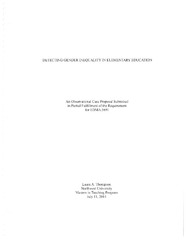| dc.contributor.author | Thompson, Laura A. | en |
| dc.date.accessioned | 2017-10-02T22:47:02Z | |
| dc.date.available | 2017-10-02T22:47:02Z | |
| dc.date.issued | 2014-07-11 | en |
| dc.identifier.uri | archives.northwestu.edu/handle/nu/25721 | |
| dc.description.abstract | Primary education is a ubiquitous and an indispensable social service offered in our society. From an early age gender bias has been detected in female students who are more likely to experience a division between their quantitative comprehension abilities and those of their male counterparts in elementary math. The most prevalent reason for this divide seems to be a sense of insignificance resultant from underrepresentation in classroom participation portions of lessons, which lowers the perceived value of and individual confidence in their abilities. This paper studies previous research on this topic and then undertakes an observational study to see if this practice is still occurring. | en |
| dc.format.extent | v, 19 pages | en |
| dc.format.medium | PDF | en |
| dc.language.iso | en | en |
| dc.publisher | Northwest University | en |
| dc.rights | This original work is protected by copyright. Copyright is retained by the author(s). Works may be viewed, downloaded, or printed, but not reproduced or distributed without author(s) permission. | en |
| dc.rights.uri | http://archives.northwestu.edu/page/copyright | en |
| dc.subject | Elementary | en |
| dc.title | Detecting Gender Inequality in Elementary Education | en |
| thesis.degree.name | Master in Teaching | en |
| thesis.degree.level | Masters | en |
| thesis.degree.grantor | Northwest University | en |
| thesis.degree.discipline | College of Education | en |


 Maintained by the Northwest University Library
Maintained by the Northwest University Library